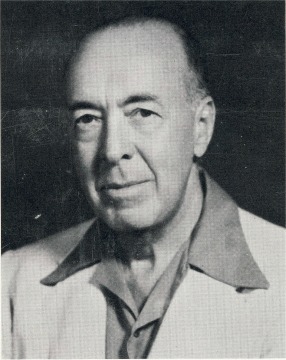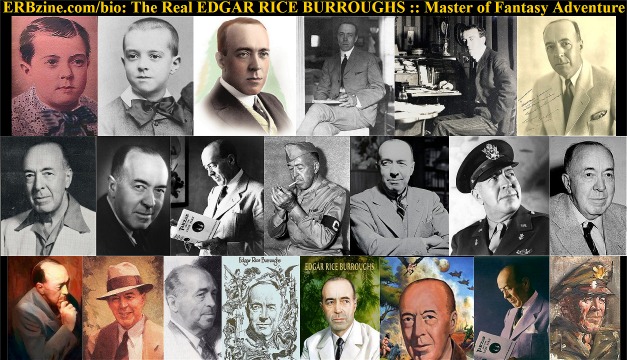
EDGAR
RICE BURROUGHS TELLS ALL
An autobiographical Sketch
by Edgar Rice Burroughs
Rob Wagner's SCRIPT :: July 9, 1932

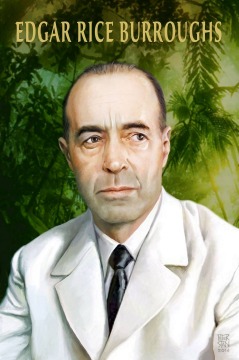 .
.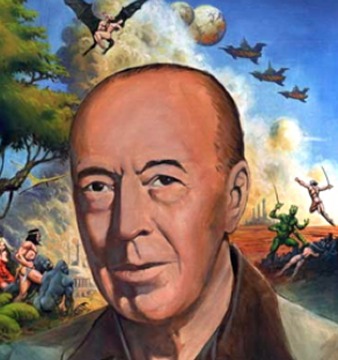
I am sorry that I have not led
a more exciting existence, so that I might offer a more interesting biographical
sketch; but I am one of those fellows who has few adventures and always
gets to the fire after it is out.
I was born in Peking at the time
that my father was military advisor to the Empress of China, and lived
there, in the Forbidden City, until I was ten years old. An intimate knowledge
of the Chinese language acquired during those years has often stood me
in good stead since, especially in prosecuting two of my favourite studies,
Chinese philosophy and Chinese ceramics.
Shortly after the family returned
to the United States I was kidnapped by gypsies and held by them for almost
three years. They were not unkind to me, and in many respects the life
appealed to me, but eventually I escaped and returned to my parents.
Even today, after the lapse of many years, I distinctly
recall the storm-torn night of my escape., Pedro, the king of the gypsies
always kept me in h is tent at night where he and his wife could guard
me. He was a very light sleeper, which had always presented a most effective
obstacle to my eluding the clutches of my captors.,
This night the rain and wind and thunder aided me., Waiting
until Pedro and his wife were asleep, I started to crawl toward the tent
flap. As I passed close beside the king one of my hands fell upon a hard
metal object lying beside him; it was Pedro's dagger. At the same instant
Pedro awoke. A vivi lightning flash illuminated the interior of the tent,
and I saw Pedro's eyes fixed upon me.
Perhaps fright motivated me, or perhaps it was just anger
against my abductors. My fingers closed upon the hilt of his dagger, and
in the darkness that followed the lightning I plunged the slip steel blade
deep into his heart. He was the first man I had ever killed; he died without
a sound.
My parents were rejoiced by my return, as they had long
since abandoned all hope of ever seeing me again. For a year we travelled
in Europe, where under a tutor, I pursued my interrupted education to such
good effect that I was able to enter Yale upon our return.
While at Yale I won a few athletic honours , annexing
both the heavy-weight boxing and wrestling championships; and in my senior
year I captained the football team and the crew. Graduating summa cum
laude, I spent two years at Oxford and then returned to the United
States and enlisted in the army for a commission from the ranks.
At the end of two years I received my appointment as a
second lieutenant and was attached to the 7th Cavalry. My first active
service was with Custer at the battle of the Little Big Horn, of which
I was the sole survivor.
My escape from death during the massacre was almost miraculous.
My horse had been shot from under me, and I was fighting on foot with the
remnant of my troop. I can only guess at what actually occurred; but I
believe that the bullet that struck me in the head must have passed through
the head of the man in front of me and, which its force spent, merely have
stunned me.
I fell with my body between two small boulders; and later
a horse was shot above me, his body falling on top of mine and concealing
it from the eyes of the enemy, the t wo boulders preventing its weight
from crushing me. Gaining consciousness after dark, I crawled from beneath
the horse and made my escape.
After wandering for six weeks in an effort to elude the
Indians and rejoin my people, I reached an army outpost, but when I attempted
to rejoin my regiment I was told that I was dead. Insistence upon my rights
resulted in my being arrested for impersonating an officer.
Every member of the court knew me and deeply deplored
the action they were compelled to take; but I was officially dead, and
army regulations are army regulations. I took the matter to Congress, but
had no better success there; and finally I was compelled to change my name,
adopting that which I now use, and start life all over again.
For several years I fought Apaches in Arizona; but the
monotony of it palled upon me, and I was overjoyed when I received a telegram
from the late Henry M. Stanley inviting me to join his expedition
to Africa in search of Dr. Livingstone.
I accepted immediately and also put five hundred thousand
dollars at his disposal, but with the understanding that my name or my
connection with the expedition was not to be divulged, as I have always
shrunk from publicity.
Shortly after entering Africa I became separated from
the relief party and was captured by Tippoo Tib's Arabs. The night that
they were going to put me to death I escaped, but a week later I fell into
the hands of a tribe of cannibals. My long, golden hair and my flowing
mustache and beard of the same hue filled them with such awe that they
accorded me the fearful deference that they reserved for their primitive
gods and demons.
They offered me no harm, but kept me a prisoner among
them for three years. They also kept in captivity several large anthropoid
apes of a species which I believe is entirely unknown to science., The
animals were of huge size and of great intelligence, and during my captivity
I learned their language, which was to stand me in good stead when I decided,
many years later, to record some of my experiences to the form of fiction.
I finally escaped from the cannibal village and made my
way to the coast, where, penniless and friendless, I shipped before the
mast on a wind-jammer bound for China. Wrecked off the coast of Asia, I
eventually mad my way overland to Russia, where I enlisted in the imperial
cavalry. A year later it happened to be my good fortune to kill an anarchist
as he was attempting the assassination of the Czar; for this service I
was made a captain and attached to the imperial bodyguard.
It was while in his Majesty's Service that I met my wife,
a lady-in-waiting to the Czarina; and when, shortly after we were married,
my grandfather died and left me eight million dollars, we decided to come
to America to live.
With my wife's fortune and mine, it ws unnecessary for
me to work; but I could not be idle; so I took up writing, more as a pastime
than as a vocation.
We lived in Chicago for some years and then came to Southern
California, where we have lived for more than thirteen years at that now
famous watering place, Tarzana.
We have eleven children, seventeen grandchildren, and
three great-grandchildren.
I have tasted fame -- it is nothing. I find my greatest
happiness in being alone with my violin.
The End
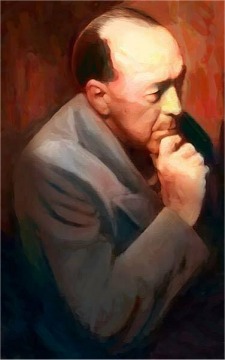
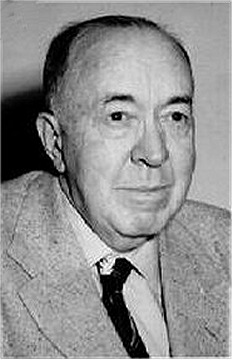






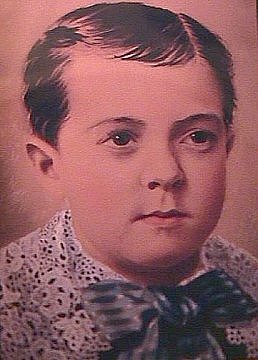 .
.